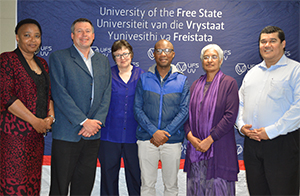Latest News Archive
Please select Category, Year, and then Month to display items
02 January 2025
|
Story Gerda-Marie van Rooyen
|
Photo Supplied
 Leading the research in South Africa is Prof Linus Franke from the Department of Soil, Crop and Climate Sciences.
Leading the research in South Africa is Prof Linus Franke from the Department of Soil, Crop and Climate Sciences.
Scientists are actively pursuing the successful breeding of diploid hybrid potatoes from inbred lines. This is expected to revolutionise potato breeding as it holds the key to rapid genetic progress. It will introduce new varieties for commercialisation through seed. Currently, existing potato variants have a gene that renders self-pollinated seeds infertile.
Prof Linus Franke, an academic in the Department of Soil, Crop and Climate Sciences at the UFS, is leading the research in South Africa. “This technology allows the production of genetically uniform potato seed that is easy to transport and largely disease-free.” He says this differs from conventional breeding whereby only vegetative propagation is possible due to tetraploid varieties in potatoes. It also risks carrying pests and diseases from one generation to the next – leading to the accumulation of pests and diseases with each round of multiplication.
Seed innovation
Prof Franke explains that Solynta BV, a seed company based in the Netherlands that produces potato varieties that can be grown from seed, has included South Africa in their research efforts because it is one of Africa’s largest producers and exporters. Through his academic relationship with Wageningen University and Research, a Dutch institution renowned for its agricultural endeavours and food production, the UFS became involved in researching hybrid potatoes grown from seed.
Diploid seeds containing two sets of chromosomes allow easier gene manipulation to increase predictability and speedier genetic progress. The breeding approach enables the incorporation of tolerance to pests, diseases, abiotic stresses (cold, heat, drought) and other desired genetic traits.
Although Prof Franke is optimistic about this research, he is not blind to disadvantages. “Potato seeds are tiny and have little energy reserves, making it harder to grow potatoes from seed than from tubers.” He says potatoes from seed will take longer to cultivate than tubers, as farmers need to grow plantlets from seeds first, adding six weeks to the growing period. “It is possible that commercial farmers can grow potatoes directly from seed. Alternatively, perhaps more likely, specialised growers will produce tubers of potatoes from seed; these tubers are then sold as seed tubers to other potato farmers, who then continue their normal practices of producing potatoes for the market from tubers.”
Financial benefits
Prof Franke says farmers have reason to get excited. “Seed potatoes will reduce input costs, as varieties with enhanced tolerance to pests and diseases require less pesticides. Planting one hectare of potatoes requires three to four tonnes of potato tubers, but only one 25 g packet of potato seeds.” Since potatoes are a more valuable commodity than maize, this technology might also increase farmers’ income potential.
Qwaqwa Campus launches new degree in Community Development
2016-11-29

Photo (from the left): Morongoe Mohaleroe
(Department of Social Development), Albert Schoeman
(Assistant Dean: Faculty of the Humanities),
Dr Elsa Crause (Campus Vice-Principal:
Academic and Research), Grey Magaiza
(Programme Head: Community Development),
Dr Margie Maistry, and Prof Darren Lortan
(both from Durban University of Technology).
From 2017, the Qwaqwa Campus of the University of the Free State will offer a new professional degree in Community Development. This was revealed during the launch that was recently held on the campus.
Speakers acknowledged the positive contribution the new degree was expected to make in the region, especially in mobilising the civil society to join hands with the government in improving the quality of life in South Africa.
“There has always been a dire need for such a degree in this part of the country,” said Morongoe Mohaleroe, the Thabo Mofutsanyana District Director in the Department of Social Development.
“Our department is working hard at both national and provincial levels to professionalise this sector, and the qualification will definitely help in that regard,” she said.
Mohaleroe also thanked the campus for supporting her department with community-based research and studies by students.
Speaking during the launch, the Campus Vice-Principal: Academic and Research, Dr Elsa Crause, said the campus was proud to be the first in the country to offer this professional qualification.
‘‘What has brought us all here today, is history in the making,’’ she said to an audience consisting of a broad spectrum of stakeholders, including government and civil society structures like Save the Children and World Vision.
“Our campus will be the first in South Africa to offer this type of degree and a maximum of only 35 students will be accepted,” she added.
For more details, prospective students may contact Grey Magaiza (Programme Head: Community Development) at magaizag@ufs.ac.za or +27 58 718 5419.